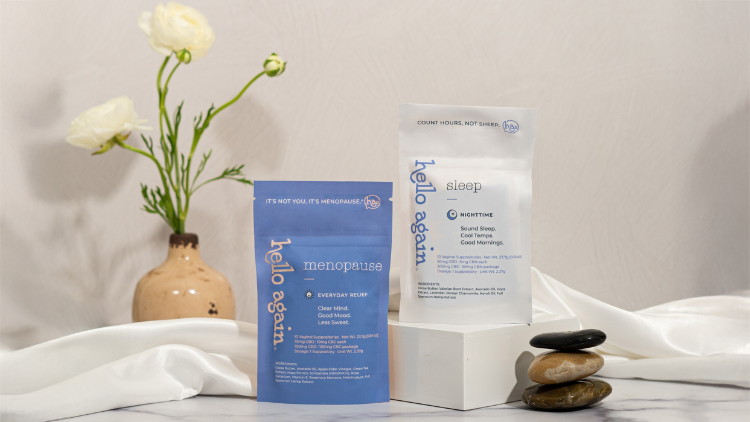What Is Perimenopause?

You’re not imagining it—something is changing. Maybe your period’s suddenly unpredictable, your sleep is hit-or-miss, or your patience is wearing thin over things that used to roll right off your back. If you’ve ever found yourself wondering, “Is this normal?” You might be in perimenopause.
Perimenopause is the lead-up to menopause, and yet most women don’t hear that word until they’re already knee-deep in the symptoms. It’s often misunderstood, misdiagnosed, or overlooked—even though it can last for years and affect everything from your mood to your memory to your monthly cycle. One recent study found that more than half of women ages 40 to 64 had experienced symptoms related to perimenopause or menopause, yet only 8% had received a confirmed diagnosis. That gap? It’s precisely why so many women feel confused, dismissed, or unprepared.
Here’s the thing: we know our bodies, and when we see what’s happening in them, we can take action and do something about it. Early awareness means you can seek out real support, explore options that actually work for you, and avoid the confusion that so many women face when the symptoms start to roll in.
Perimenopause doesn’t come with a manual—but we’ve got the next best thing: a clear breakdown of when it starts, what symptoms to watch for, and how to navigate the transition with a little more knowledge and a lot more confidence. You deserve to feel informed, empowered, and supported every step of the way.
Perimenopause vs. Menopause
Let’s clear things up: perimenopause is not the same thing as menopause. It’s the transition phase leading up to it—a time when your hormones (mainly estrogen and progesterone) start fluctuating, cycles get irregular, and symptoms begin to pop up. You might notice hot flashes, mood swings, sleep issues, or a sudden inability to predict when (or if) your period is showing up.
Menopause, on the other hand, is a single milestone: you officially reach menopause when you’ve gone 12 consecutive months without a period. No spotting, no skipped-month surprises—just a full year of menstrual silence. Until you’ve hit that mark, you’re in perimenopause.
Perimenopause can last anywhere from 4 to 10 years. Yep, years. Some women breeze through it in a matter of months, while others feel like they’ve been riding the hormonal rollercoaster for the better part of a decade. There’s no universal timeline, no set checklist. Your experience is valid, even if it looks nothing like your best friend’s—or your mom’s.
What matters most is knowing what’s happening so you can meet your body with curiosity, not confusion. Perimenopause is a process, not a problem. Understanding the difference between this phase and menopause can help you tune into what your body needs, rather than constantly wondering, “Is this normal?” (Spoiler: it probably is.)

Recognizing the Symptoms of Perimenopause
Perimenopause can feel like your body’s throwing a series of unexpected curveballs. One day, you’re cruising; the next, you’re wondering who’s hijacked your hormones. Let’s break down some of the most common symptoms so you know you’re not alone—and definitely not imagining things.
Irregular Periods
Your once-predictable cycle now has a mind of its own. Periods may come earlier, later, heavier, lighter, or decide to ghost you for a month or two. This unpredictability is often one of the first signs that perimenopause is knocking.
Hot Flashes and Night Sweats
Sudden waves of heat that leave you flushed and sweaty? Welcome to the world of hot flashes. It’s a double whammy when they crash your sleep as night sweats. Approximately 75% to 80% of women experience these vasomotor symptoms during the menopausal transition.
Mood Swings and Irritability
Feeling like you’re on an emotional rollercoaster? Fluctuating estrogen levels can affect your mood, resulting in unexpected mood swings. It’s not just in your head—it’s in your hormones.
Sleep Disturbances
Struggling to fall asleep or stay asleep? Hormonal changes, combined with night sweats, can turn restful nights into restless ones. Quality sleep might become elusive, adding fatigue to your list of grievances.
Brain Fog
Misplacing keys or forgetting names more than usual? Cognitive blips, often dubbed “brain fog,” are common during perimenopause. While frustrating, they’re a typical part of the transition.
Vaginal Dryness and Libido Changes
Lower estrogen levels can lead to decreased vaginal lubrication, making intimacy uncomfortable. You might also notice shifts in sexual desire—higher, lower, or just different.
Fatigue
Even with adequate rest, you may feel persistently tired. Hormonal upheaval can drain your energy in ways that go far beyond just missing sleep.
Remember: These symptoms can come and go, vary in intensity, and sometimes make you wonder if you’re losing your mind. But you’re not alone, and there’s nothing unusual or “crazy” about what you’re experiencing. Understanding these changes is the first step toward managing them and maintaining your quality of life.
So What’s Happening in Your Body During Perimenopause?
Let’s talk hormones—specifically, estrogen and progesterone, the two leading ladies of your reproductive system. During perimenopause, these hormones start to fluctuate like they’re freelancing—sometimes surging, sometimes dipping, often without warning. And when they’re out of sync, your whole body tends to feel the ripple effect.
Estrogen, for example, helps regulate everything from your body temperature to mood, memory, and vaginal health. When it starts to decline (and trust us, it doesn’t do it quietly), you might experience hot flashes, brain fog, mood swings, and joint aches.
Progesterone is your body’s natural calming agent—it promotes restful sleep and helps keep anxiety in check. But as progesterone levels start to drop, you may notice it’s harder to wind down at night or that you’re more easily rattled by everyday stress.
These hormonal ups and downs affect your nervous system, endocrine system, and brain chemistry, which is why perimenopause can feel like it’s touching everything. The result? One day, you’re fine; the next, you’re wide awake at 3 AM, sweating through your sheets and wondering why you snapped at a houseplant.
Understanding these shifts doesn’t magically make the symptoms disappear, but it does give you the power to respond with more compassion and better solutions. Your body isn’t broken; it’s just rewiring.

Perimenopause Support That Works
Perimenopause isn’t something you just “power through”—it’s a significant life transition, and yeah, it deserves real support. And not just symptom relief, but complete wellness. Support for your mood, your sleep, your energy, your confidence. The good news? There’s no shortage of options. The not-so-good news? You may need to try a few before finding what fits. And that’s okay.
Let’s start with the foundation: lifestyle shifts. What you eat, how you move, and how you rest can all make a noticeable difference. A diet rich in whole foods, phytoestrogens, healthy fats, and key nutrients (like magnesium, B vitamins, and omega-3s) can help support your changing body. Add regular movement—such as walking, yoga, or strength training—and prioritize sleep hygiene as if it were your top priority. You deserve rest that feels restful.
Next up: stress management. Because when your hormones are on a rollercoaster, stress is the thing that makes the ride bumpier. Whether it’s mindfulness, meditation, therapy, journaling, or just saying “no” more often, this is the time to protect your peace. Boundaries aren’t selfish; they’re survival.
If you’re seeking symptom support without the use of hormones, non-hormonal options are absolutely worth exploring. Supplements can help fill nutritional gaps. Hello Again’s plant-powered vaginal suppositories are thoughtfully formulated to help support mood, sleep, and overall balance. No hormones, no hassle—just consistent, targeted relief designed for your body and your life.
Bottom line? There’s no one-size-fits-all answer here. Perimenopause is deeply personal, and you deserve care that reflects that. Explore, experiment, and don’t be afraid to ask for help. It’s a major shift—and also a chance to give yourself the self-love and support you truly deserve.
Why Perimenopause Needs a Rebrand
Let’s be real, perimenopause has a serious image problem. Most of us weren’t taught about it, doctors don’t always bring it up, and when it is mentioned, it’s often framed as something to “get through” quietly. Cue the eye roll.
But understanding what’s happening in your body? That’s powerful. It gives you the confidence to speak up, ask questions, and make decisions that serve you. Perimenopause isn’t the beginning of the end—it’s the start of a new phase where you’re in charge.
And being in charge means trying what works—even if it’s not what your doctor handed you in a pamphlet. Reaching for something like Hello Again isn’t a last resort—it’s a bold, informed choice. A plant-based, non-hormonal product specifically designed by women, for women in this transition? That’s the kind of forward-thinking support more of us deserve.
The more we talk about perimenopause, the more we normalize finding what feels right—and celebrating those decisions, not questioning them.

You Deserve to Know What’s Going On
Perimenopause is real, it’s natural, and it’s absolutely worth talking about. It’s not something to ignore, minimize, or just push through—it’s a major shift that deserves your attention, care, and support that works for you.
That might look like changing your routine, setting better boundaries, or reaching for something designed with your body in mind—like Hello Again—non-hormonal, plant-based vaginal suppositories created to support women through every phase of this transition with ease, intention, and zero shame.
Stay curious. Ask questions. Be gentle with yourself when things feel off, and don’t be afraid to try something new, especially when it’s made by women, for women, and backed by real understanding. You’re not alone in this; you deserve options that feel as empowering as they are effective because your story is just getting good.
Key Takeaways
- Perimenopause Is Real—and It Can Start Sooner Than You Think: This hormonal transition isn’t just a warm-up act for menopause. It can begin in your late 30s or early 40s and bring a mix of symptoms like brain fog, mood swings, and disrupted sleep. You’re not imagining it—and you’re not alone.
- Support Should Be as Unique as Your Symptoms: There’s no one-size-fits-all approach to perimenopause. From lifestyle shifts to plant-powered, non-hormonal support like Hello Again, it’s all about finding what helps you feel like yourself again.
- Education Is Empowerment: When you understand what’s going on in your body, you can advocate for your health with confidence. Knowledge opens the door to new solutions, informed choices, and a more grounded, empowered journey through this phase of life.